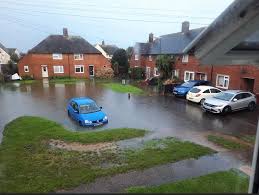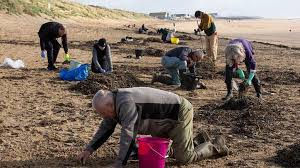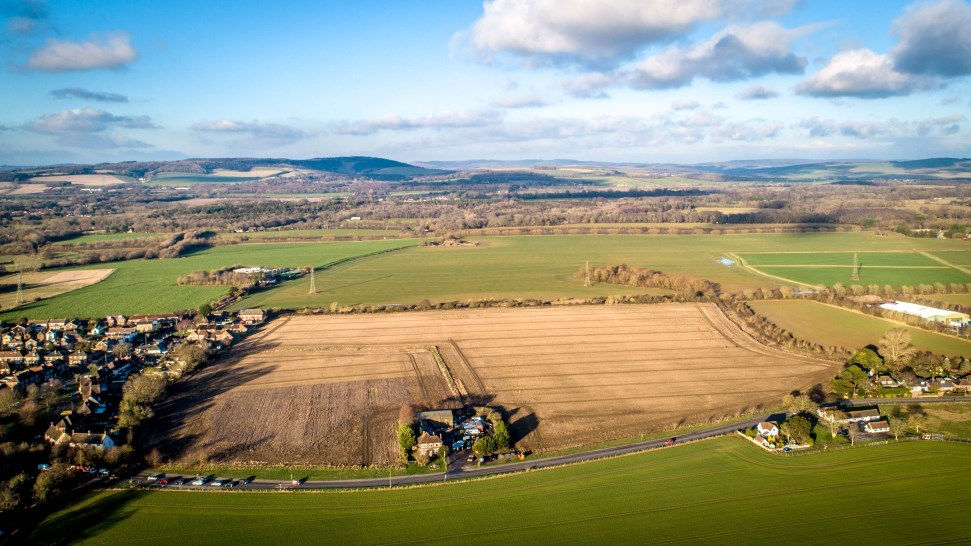SOSCA NEWS BULLETIN NO 13
- Libby Alexander

- Oct 22, 2025
- 10 min read
OCTOBER 2025
INTRODUCTION
The months since the Labour Party won the election has been taken up with constant reviewing of policies that had been in place with a Conservative Government. These policies regarding housing numbers, infrastructure, climate change, flooding etc. are constantly being amended and they all require updating on a regular basis. There is very little warning so it is important that we share our observations across other concerned groups.
There have also been a regular stream of meetings on updating the issues regarding:
the future of our drinking water
our housing numbers
holding SW to account for sewage matters
the fight to save our agricultural land
the defence of our coastline
the issues with flooding
To mention but a few.
There has also been a series of public consultations which SOSCA has responded to on behalf of our supporters. We have also attended Planning meetings for the public and engaged with the national media. We have the support of our MP Jess Brown-Fuller and on many of these matters forward to her as much relevant information as possible.
MEDIA
National Newspapers Headlines

The public anger at the state of our water companies and the amount of money flowing into the pockets of senior management over what are failing companies naturally caught the eye of much of the national media. We write to the various papers expressing our various concerns and are much rewarded when the occasional journalist gets in touch in response. The most recent being the Financial Times and The Times. With the FT one was for the state of Southern Water and another for the views on the Recycling project. With the Times we expressed our strong belief that solar panels should be placed on the roofs of public buildings and not on prime agricultural land.
HOUSING
Building On Brownfield Sites (Bluebeam Blog)

The housing numbers continue to be beyond sustainable. 73% of land is taken up by the South Downs National Park, 3.5% by the AONB of Chichester Harbour all protected against development. The government target was 575 houses per year from 2021-2030 and 701 houses per year from 2030-2039 equating to 11,484 in total.
No infrastructure in place with Southern Water relying upon SUDS. No traffic assessment for increased home car ownership along the A259. No acknowledgment of increase of traffic right across the region in the summer months with the Manhood Peninsula a notable cul de sac. No mention of creating a link road from Southbourne or Bosham on to the A27 to relieve the Fishbourne roundabout. The speed at which the houses are being built brings into question the quality of the construction techniques and the lack of storage are amongst the concerns of new buyers. The Competition and Markets Authority found that so many of the new builds were plagued with a series of snags that were often not rectified. The most common criticisms were for being smaller than older homes and most being built to maximise profit rather than prioritising space or functionality. The average cost of a new build was now £424,049.
Here are some interesting stats from Community Planning Alliance:
There are 1.5 million derelict homes that could be renovated. There are 1 million unbuilt homes with planning permission that should be built. There are 1.2million homes that should be developed on brownfield sites before any green belt development. There are approximately 165,000 empty commercial properties that could be repurposed.
According to Shelter there are 1.3million people on housing waiting lists and 150,000 children who are living in temporary accommodation. The lack of Social Housing is the greatest obstacle to the cohesion of communities their wellbeing and the aspirations of so many. Demanding a blanket 300,000 homes to be built each year without any understanding of the need to protect our fragile environment, to understand the nuances of each location, of ignoring our National need for food security, and giving developers a blank cheque to build what they want where they want is not responsible governance.
DEFENDING OUR COASTLINE - CLIMATE CHANGE

Hayling, Langstone, Fishbourne, and Climping are local examples which have all been subject to the growing strength of recent storms where solid defences have been swept away and sea surges have reached further inland than ever before. Coastal Partners grew out of ESCP (Eastern Solent Coastal Partnership) and now advises five councils including Chichester District Council. Its experienced engineers now oversee the protection of 246 km of our local coastline. Also SCOPAC Standing Conference on Problems Associated with the Coastline. They also play a crucial role in advising the councils and working with government.
APULDRAM MEADOWS REALIGHNMENT


To counter the rise in sea levels and storm surges there is a project about to be unfolded at Apuldram. Saltmarshes are crucial to the holding back of sea level rises but we have lost 58% of our saltmarsh since recording began in 1946. At the current rate of loss, remaining saltmarsh will be gone by the next century. The leading cause of saltmarsh loss is coastal squeeze – whereby with rising sea levels, saltmarsh becomes trapped up against man-made sea defences and cannot migrate inland, as nature intended. It is no longer sustainable to maintain fixed-location sea walls – the harbour is a constantly changing and dynamic environment and must be allowed to adapt to future challenges. This is reflected now in the consenting regime, whereby seawall repairs are considered unsustainable and will not be permitted – the status quo simply cannot continue to be maintained. Apuldram Meadows are to be part of the establishment of new marshes across the Harbour with the present defences (already broken) to allow the incursion of the sea in a controlled manner.
Whilst SOSCA is supportive of the scheme we have however raised concerns over the proximity of the Apuldram WWTworks.
FLOODING
Peerley Close Stubscroft Farm
With regard to the housing that is now vulnerable to flooding some statistics state that: The number of properties on the flood plain in England is expected to double by 2065. Four million people and £200 billion of assets are at risk of flooding from rivers or sea. 3 million properties are at risk of surface waterflooding where no early warnings are available. There have been 40 million early warning messages sent for river and sea flooding over the past 10 years. Just recently the Environment Agency admitted that about 6 million homes are considered at risk of flooding in England with an expectation that the number will rise to eight million by 2050. Why then, one might ask, does the Environment Agency continue to allow the Planning Inspectors to give planning permission to developers who continue to build on flood plains. The perfect example of just such a planning permission granted can be seen first hand at Highgrove Farm in Bosham.
SOSCA is constantly reminding government representatives when responding to consultations that it is paramount that we get the right kind of development in the right places to deliver sustainable growth and to create infrastructure resilience to flooding and coastal change. A thankless task but one which SOSCA will continue to raise.
MEETING WITH MP JESS BROWN-FULLER
Chichester Students Volunteering
There has been a regular engagement with our MP and through SOSCA’s social media her work on our behalf has been well recorded. SOSCA was requested by her to arrange a meeting of councillors and others to discuss the issues of flooding across her constituency. There had been a series of planning decisions that had been granted which were on well recorded and researched as zoned flood plains. It was a most helpful meeting with a free discussion over a variety of common issues dealing with flooding across our coastal plain. There were many suggestions for action including approaching Chichester College. This has now been done.we are most grateful. Our social media has been immensely influential keeping everyone abreast of the reality of our situation with updates, photos, and input from all the many local action groups.
CHICHESTER COLLEGE

When approached by SOSCA with the idea of a possible partnership the response was immediate and positive. The meeting was between the newly appointed Director of Environment and Sustainability. She is very keen to set up an inhouse programme on courses dealing with our environment including flooding. For this initiative to involve SOSCA on a regular basis and to be rolled out across all five colleges that Chichester is affiliated with. We are naturally delighted with this outcome for one of the missing aspects of our work has been the difficulty in engaging with the young. Chichester College has won many plaudits for its popularity as a centre of learning with the young and so we are very excited to be part of their success and enthusiasm. Our goal will be to bring to their attention the realities that we face across our Coastal Plain. It will be challenging how to face the future but by engaging with the students we can use their talents to help put forward positive ideas to make changes.
ENVIRONMENT - FOOD SECURITY
Chichester Arable Fields

In January of this year the Government launched a consultation on Land Use. This was to discuss how to protect the most productive agricultural land and boost food security. At the time the then Minister declared that ‘This Government has a cast-iron commitment to maintain long—term food production.’ And again: ‘This framework will give decision makers the toolkit they need to protect our highest quality agricultural land’. This is patently not happening across our valuable Chichester Coastal Plain.
BEST AND MOST VERSATILE AGRICULTURAL LAND
Highgrove Farm | Before & After
The most pressing concern with our present planning is with the continued destruction of our BMV (Best and Most Versatile) agricultural land with mass development. The government is constantly reminding the public that it is important that we have national food security. The National Preparedness Commission quotes: ‘The first duty of government is to defend all citizens and that should include a duty to ensure that the nation is fed in times of crisis.’ Apparently even with the knowledge that climate change will impact the world’s food chains the UK’s National Risk Register (NRR) does not recognise this possible threat.


It also does not help that the Labour Government’s Minister for Food Security and Rural Affairs – David Zeichner, was heard to say at the Norfolk Farming Conference that: ‘Farming is not high up in the Government pecking order’. Perhaps this is a warning that consultations are nothing but a front because they – the government - have already made up their minds that our land will be given over to developers to do what they wish. Which is at odds with the Defra consultation on Land Use which says ‘This framework will give decision makers the toolkit they need to protect our highest quality agricultural land’.
This year DEFRA has committed to developing a food strategy which has 4 themes: Food Security; Food Resilience; Food Health; Growth. It will be interesting to see what actually happens.
ENVIRONMENT - LAND USE

SOSCA’s Response to one of the questions: Pressures & Challenges
The most contestable challenge in relation to land use in England is the Planning system. It has allowed the continual construction of uniform unsustainable badly designed housing developments that are so often built on green field agriculturally rich sites. These developments have for decades been the source of raw sewage discharges into our rivers and seas resulting in the pollution of highly protected environments such as AONBs, SSSI and Ramsar sites.
Competing priorities for land used should be managed with a greater emphasis on giving local communities a more powerful voice. At present government policy has undermined their effectiveness cutting back on their funding and the implementation of centralised control.
The key drivers of land use should privilege biodiversity, safety from flood risk and food security to the same degree as it protects landscape quality. The lack of value attached to these issues is unsustainable and fails to recognise the risks of climate change and significant geopolitical shifts.
Due to the Covid pandemic the need for high rise office blocks is being appraised and our highstreets are suffering from a huge decline in traditional shopping habits. This presents a unique opportunity for a complete re think on how we use our cities, how our needs on infrastructure might change, and what might be the reinvention of leisure and wellbeing of its citizens.
It is important that government has a clear idea of what the priorities are for land use. As a result of a changing geo political scene it appears that energy and food security are now the most pressing requirements and that both should be home grown.
(This is just one of our responses to the many Questions that were asked which were usually opened with a tick box of agree or disagree – Needless to say we opened our responses with disagree for most of them).
WATER COMPANIES
Apuldram Waste Water Works

In July of this year the government released the Cunliffe Report on the state of the Water Industry. It was hailed as a once in a lifetime opportunity to change the culture of the industry. He admitted : ‘that the industry as a whole, has not met public expectations or maintained public trust in recent years. Some companies
have manifestly acted in their private interest but against the public interest. That must be prevented in future’.
These are very fine words but of course there was nothing within the report that actually held the companies to account. Several national environment groups were quick to point out that this again was full of promises but with no concrete policies to instruct government departments to impose regulation. It was all about ‘charting a path,’ and ‘guiding the use and development of our water systems.’
What is needed is a complete overhaul of the regulatory framework with a government agency that is well funded, and given the power to enforce regulations and protect our AONBs and SSSIs etc . That Ofwat to be disbanded. It should be replaced by independent professionals who have not been part of present agencies nor employees (past or present) of the water companies. That the environmental standards be reviewed to counter and understand the emerging pollutants and forever chemicals that are now part of the discharges into our seas.
The difficulties will come in the challenges to untangle the ownership of the water companies who have all created a scaffold of minor companies to distract from their financial debts. There is no doubt that with all the companies it is the weakness of the governance structures that have created the present lack of oversight. It is the Ministry (Defra) that should be responsible not a series of quangos. It should take full responsibility for a national water strategy that includes:
Water storage
Water distribution
Pollution elimination
Accurate growth forecasting for potable and waste water
Accurate cost and revenue forecasting
Contact
If you have any comments or ideas on the above, please do get in touch.
We welcome any input, any links, any connections.







Comments